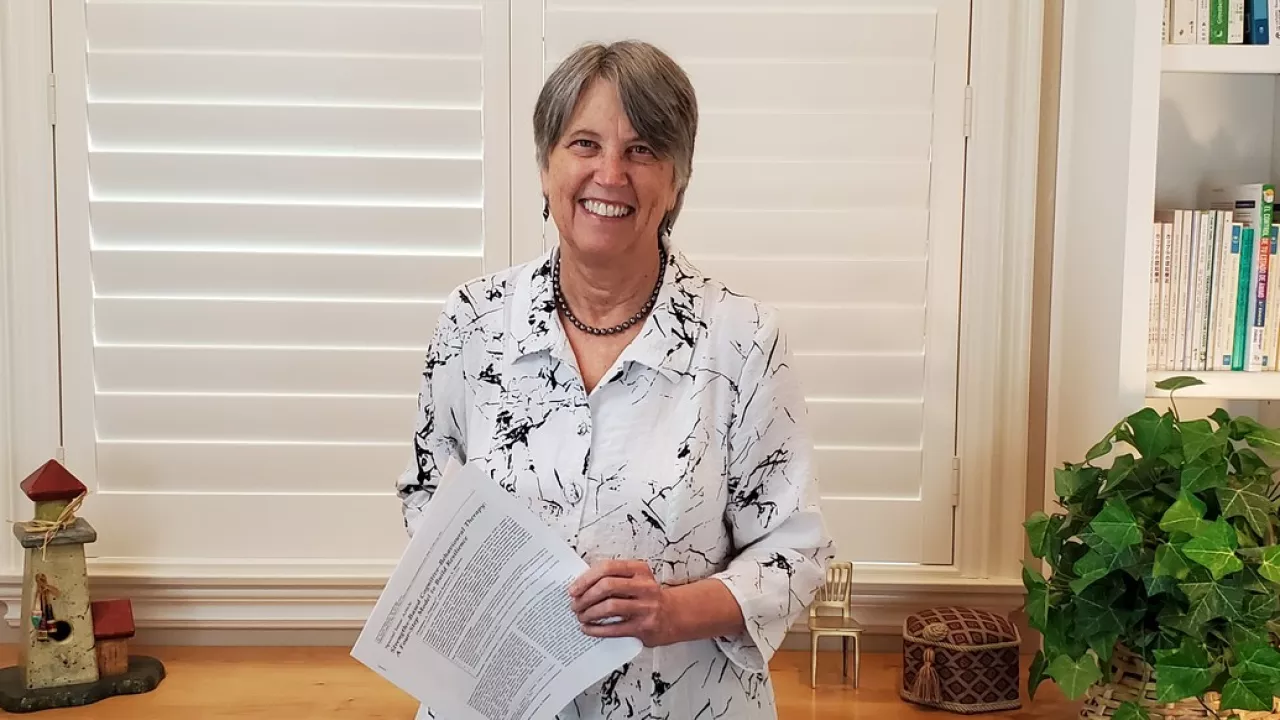Dr Christine A Padesky in new CBT programme at UEL
Dr Christine A Padesky in new CBT programme at UEL
Published
09 July 2020
Share
The Department of Professional Psychology at the University of East London (UEL) recently hosted a live Q&A session with one of the world's leading cognitive behavioural therapy (CBT) innovators, announcing the launch of a new postgraduate certificate in strengths-based CBT (subject to validation) in September.
Dr Christine A Padesky, a world-renowned CBT author and trainer, engaged in a lively online discussion hosted by the School of Psychology. It was announced that Dr Padesky will be contributing as specialist guest lecturer and advisor for the new programme - the postgraduate certificate in strengths-based CBT.
The programme will examine the development of a resilience 'muscle', underpinning this notion with an introduction to the neuroscience that led to discoveries about some of the actual processes of therapy itself.
Dr Padesky has been in favour of a focus on personal strengths over personal problems since the days of her postgraduate studies in Los Angeles, California. Having witnessed a lack of interest in viewing CBT through this lens at that time, she decided to lead on this crucial development in CBT theory and practice. She has more than 40 years' experience and has taught more than 50,000 therapists in 500 CBT workshops on five continents.
Other authors and researchers have followed her lead - there is now wide-ranging interest in the development and understanding of a focus on strengths in a therapeutic context.
Organised by Max Eames, senior lecturer in counselling and psychotherapy at the University of East London, the event provided attendees with the opportunity to ask Dr Padesky about how she works and the fundamentals of engendering curiosity, resilience and personal strengths in their work with clients. The discussion explored her collaborative, client-centred and strengths-based way of working, in addition to anxiety, depression and the many cultural influences which can inform, underpin and energise being part of the helping professions.
Individuals who struggle with chronic difficulties such as extended bouts of depression, extreme anxiety, disability, chronic pain or illness - as well as those who don't relate to other traditional therapies and find themselves 'stuck' - seem to respond well to placing a focus on personal strengths and resilience, she said. “There are some things in life we cannot change, and it's often a struggle to find a means of accepting those things.”
Strengths-based approaches often assist with that process; they can also re-invigorate therapy which seems to have reached a plateau or which has not achieved the expected impact in a client's life, she explained.
Dr Padesky, an Honorary Fellow of the British Association of Behavioural and Cognitive Psychotherapies (BABCP), is co-author of seven books, including Mind Over Mood, which was voted by the BABCP as the most influential CBT book of all time.
Paula Cancelas Yanez, a postgraduate student in counselling and psychotherapy, noted that she felt "privileged" to attend and described the event as "amazing" and "once-in-a-lifetime", and Natalie Bear, a postgraduate student in integrative counselling and coaching, felt encouraged by Dr Padesky to "be brave and persistent", noting the importance of "being all in."
Dr Padesky commented at the close of the evening's discussion, "It encourages me to hear so many compassionate and curious questions about CBT and how best to help clients" from UEL's professional psychology students.
We are thoroughly delighted that Dr Padesky will be sharing her uniquely positioned expertise and experience as part of the training team as we embark on the launch of this exciting new postgraduate certificate,"
Professor Aneta Tunariu, dean of the School of Psychology, said,
The new training programme will be offered in an 'executive-style' format, to appeal to busy working practitioners in health and social care, nursing, social work, advocacy, education, psychology and psychotherapy, as well as others from the allied helping professions.
The monthly meetings will take the form of interactive Friday evening sessions and day-time workshops on Saturdays, with supervised skills-practice sessions.
Professor Cindy Fu will bring her background and keen interest in affective neuroscience to this training, giving students an opportunity to engage with her research on neuroplasticity, mindfulness, and the neural correlates of CBT at play in mood-states such as depression. She will teach alongside Max Eames, a senior-accredited psychotherapist and practitioner.
According to Max Eames, cognitive behaviour therapy (CBT) struggles with an undeserved and inaccurate public perception as a 'paint-by-numbers' form of therapy which fails to enact long-lasting change. He is keen to dispel the many myths about CBT, and his "undergraduate and postgraduate students are surprised to learn the fascinating truths of why CBT is so widely embraced by the NHS, yet so poorly understood by the public."
Professor Amanda Broderick, vice-chancellor and president of the University of East London, said, "The School of Psychology's expansion of its flagship training in counselling and wellbeing through the launch of the strengths-based CBT programme highlights our focus on equipping graduates for tackling real-world challenges and commitment to flexible learning for students and practising professionals."
Share
Communications team
Contact us for press and interview requests
